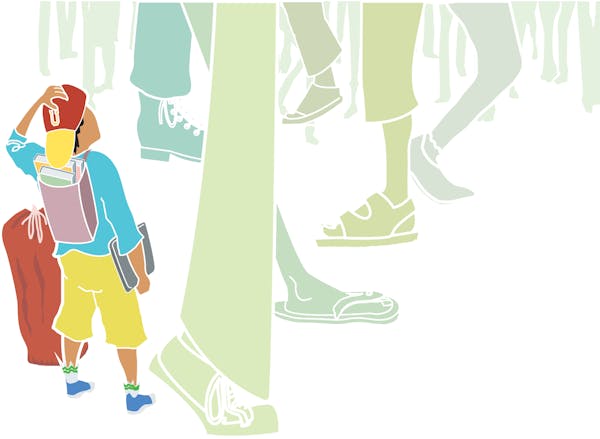Avery Bastian's pink tennis shoes matched her backpack perfectly. Her Cinderella Thermos was filled. She'd memorized the all-important personal identification number she would need to get breakfast at Hale School in south Minneapolis. And while there was a slight moment of hesitation when her mom dropped her off at Dana Elfering's classroom — "Don't leave," Avery whispered — her school career began, just like thousands of other Minnesota kids who start kindergarten this week.
This year, for the first time, the state of Minnesota is picking up the $134 million tab for full-day kindergarten, a move educators hope will provide an academic jump-start for the state's youngest learners.
Before now, about half of the state's schools were offering free full-day programming. Others offered it, but at a cost to parents of $2,000 to $4,000 a year.
Most educators are thrilled by the prospect of having more classroom time with kindergartners, some of whom enter class without knowing their ABCs or how to write their names. A longer day means that teachers can go deeper into the subjects they teach, while worrying less about the time it takes to do such things as help students take off their coats, go to the bathroom and sit down at their desks.
"Socially, emotionally, cognitively … everything is hitting the fan at this age," said Becky Magnuson, a veteran kindergarten teacher in the Forest Lake School District. "The time we have with them is very important."
Most studies show that all-day kindergarten gives students an academic boost through first grade. After that, there's less consensus.
Full-day kindergarten provides the most long-lasting benefits for poor students, studies show, particularly those learning to speak English and those with special needs.
State education leaders say all-day kindergarten might be the key to reversing the state's achievement gap between white and minority students.
"When you factor in the work we've done with the 0 to 3 population and our work with early learning scholarships for preschool, we feel like all-day kindergarten could really be a game changer," said Bobbie Burnham, director of early learning services for the state Department of Education.
Burnham said the extra class time is a particular help to ensure that every student is a proficient reader by third grade, which experts say is a critical academic benchmark.
More of what's good
Renee Blue is a veteran kindergarten teacher at Rum River Elementary in Andover, which has offered full-day kindergarten, half-day kindergarten and full-day programming every other day.
By the end of the year, it was often easy to tell the students apart based on skills.
"I really saw a huge difference in their writing samples," said Blue, president of the Minnesota Kindergarten Association. "The kids who were there every day for a full day were writing pages of words. Others weren't."
Magnuson, from the Forest Lake district, said all-day kindergarten helps ease what she calls the "nesting-in period," the first few weeks of school when kindergartners must learn such things as where to hang their coats and how to line up for the bus.
"When you have the consistency of all-day kindergarten, you start to see that anxiety decrease quicker," she said. "With half-day, I might have tears all the way to December."
A team of researchers from the University of Minnesota tracked over the course of three years more than 800 students who were enrolled in free full-day kindergarten in Burnsville during the 2003-2004 school year.
They found those students posted test scores that were higher than the national average as they entered and exited first and second grades. Factors typically considered barriers to academic achievement — being poor, a member of a minority group or a non-native English speaker — did not affect the performance of students enrolled in all-day kindergarten, according to the study.
"There were no gaps at all between these students," said Kyla Wahlstrom, one of the researchers. "Even with what we've considered risk factors in the past, students in all-day kindergarten had significant gains."
Eva Phillips, an assistant professor at Winston-Salem State University in North Carolina, called Minnesota's decision to fund all-day kindergarten "a great opportunity."
She said kindergarten serves as a crucial bridge between childhood and early grades when students learn skills that will carry them through adulthood. "In my opinion, it's more of what's good," she said.
'Exhausting' for some kids
Most school districts have made the switch to all-day kindergarten. About 54,000 students, or 95 percent of the state's kindergartners, will attend all-day kindergarten this year, according to the state Department of Education. Nationally, about 76 percent of all kindergarten students attend all-day classes. About a dozen states require full-day programming at no cost to parents.
Under the law, schools are not obligated to offer half-day classes. Schools must honor parents who want their children to participate in only a half-day, however.
Parents overwhelmingly favor all-day kindergarten, according to surveys conducted this spring by several Minnesota school districts.
"I'm really glad this is how my tax dollars are being spent," said Dan Riley, whose son, Jackson, is set to attend kindergarten at Horace Mann in St. Paul. "Quite frankly, we would pay for it if we had to because we believe it's what our son needs."
Some parents do worry. Many 5-year-olds still take naps; some have little experience interacting with other kids, and some are immature for their age.
"You really have to be alert to their physical needs," Magnuson said. "They're getting exposed to this constant barrage of new people. It's exhausting. I've had some parents say their child practically passes out at the dinner table."
There was no doubt for Tia Bastian that her daughter, Avery, was ready. "She learned so much in preschool — we really want to see that progress continue."
Kim McGuire • 612-673-4469
Minneapolis considers bid to host Sundance Film Festival

Teen suspect in Nudieland mass shooting arrested on murder, assault charges
'Human error' behind Robbinsdale shelter-in-place alert that was mistakenly sent countywide

